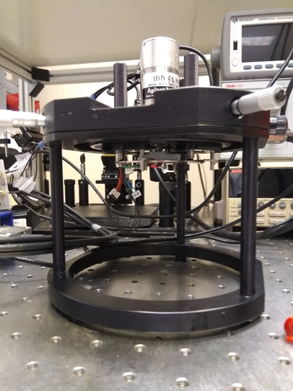Solid-Liquid Interfaces
Ice Nucleation
Heterogeneous nucleating agents (HNAs) for ice are vitally important. This is in contexts as varied as cryobiology, materials chemistry, and environmental science. For example, by modifying how water droplets freeze, HNAs in clouds play a significant role in determining cloud reflectivity as a function of wavelength. This determines how different types of cloud contribute to global warming, as a result.
One might expect an effective HNA for ice to be simply one that bonds strongly with water and makes a good lattice match to ice. The reality, however, is much more complex.
We aim to understand and control ice nucleation using model HNAs. These are engineered to have a pre-determined size, surface chemistry and topographic features. We currently focus on ice nucleation by bio-nanoparticles, such as quasi-spherical cage-like proteins.
Electrodeposition
Metal electrodeposition plays an essential role in a huge variety of applications, from corrosion-resistant coatings to ultra-large-scale integrated circuits. For applications, the microstructure and surface morphology of the electrodeposited film are key.
However, the atomic-scale processes that determine a polycrystalline electrodeposited film’s microstructure and morphology remain remarkablypoorly understood. We use scanning probe microscopy and advanced microstructural characterization techniques to probe these processes. This allows us to understand them in depth and apply our knowledge to improve their control.
We have an especially strong research record in this field. For example, we were the first group to report giant magnetoresistance in electrodeposited films.
Molecular Electronics
The vision of molecular electronics is to use individual molecules as components in electronic devices. Its attraction lies in the prospect of making nanoscale devices using a simple top-down approach. It also lies in the enormous variety of ways their properties can be tailored using the toolbox of organic chemistry.
We measure the electrical conductance of single molecules in contact with electrodes whose separation can be controlled with sub-nanometre precision. We are especially interested in the contacts between molecules and ferromagnetic metals, where spin-dependent transport is important. We are also interested in studying these nano-scale junctions under electrochemical control.

Cold stage to study freezing events.

Scanning tunnelling microscope for single molecule transport studies.